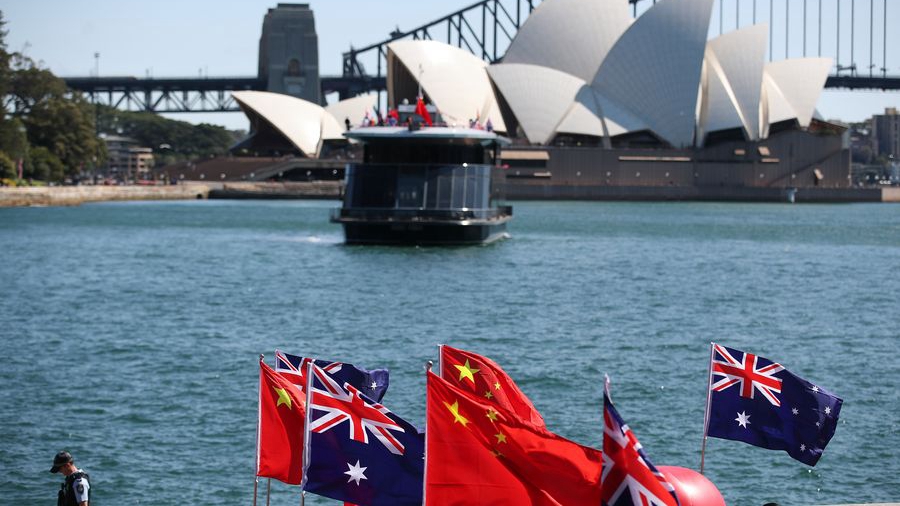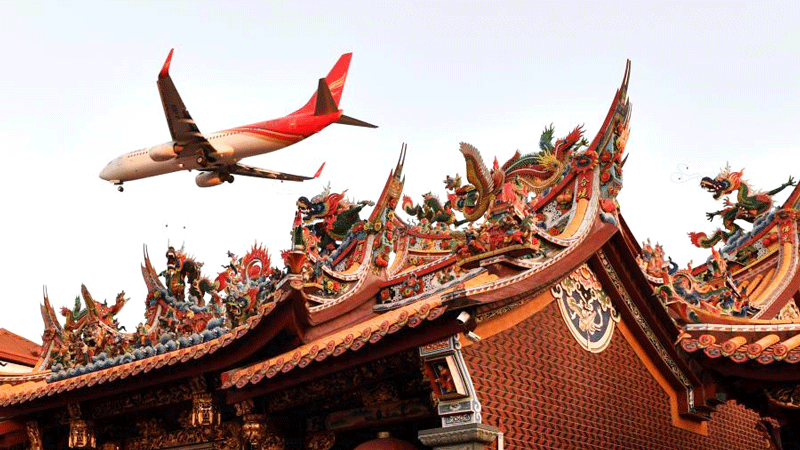China, Australia should build a better future

The Chinese and Australian national flags in Sydney, Australia. [Photo/Xinhua]
In 1972, the leaders of China and Australia, with outstanding political wisdom, established formal diplomatic relations between the two countries. As we celebrate the 50th anniversary of Sino-Australian relations, there is a need to learn from the past, follow the general trend of history and put bilateral ties on the right track, by following the principle of mutual respect and mutual benefit.
In July 1971, Edward Gough Whitlam, then leader of the Australian opposition Labor Party, visited China, showing great political courage and fending off the attacks of the ruling Liberal Party and ignoring the opposition of the United States. In doing so, Whitlam laid the foundation for the establishment of Sino-Australian ties. Since then, despite the change in the Australian government's China policy, maintaining good relations with China has been the consensus among the majority of Australian politicians.
In May 2005, China and Australia launched the first round of negotiations on a free trade agreement. After 10 years of negotiations, the bilateral FTA came into effect in December 2015, providing an institutional mechanism for the increase in China-Australia trade.
But before that, in November 2014, President Xi Jinping and then Australian prime minister Tony Abbott, during their talks in Canberra, decided to upgrade China-Australia ties to a comprehensive strategic partnership.
Over the past 50 years, China-Australia economic cooperation has been a great success. Bilateral trade amounted to approximately $231.2 billion in 2021. In fact, China is Australia's largest trading partner, accounting for nearly one-third of Australia's foreign trade. And one can even argue that Australia overcame the 1997-98 Asian financial crisis and the 2008 global financial crisis partly because of its trade with China.
However, bilateral ties have also experienced some twists and turns in recent years, mainly because of the geopolitical games of the United States. The US not only sees China's growth as a threat to its global hegemony and has branded China as a competitor, but also uses its allies and forms new partnerships such as AUKUS and the Indo-Pacific Economic Forum to check China's rise. As an important ally of the US, Australia plays a key role in the US' anti-China front, and the anti-China front formed by the US is partly responsible for the deterioration of Sino-Australian ties.
Some Australian politicians including former Australian prime minister Scott Morrison tended to securitize economic issues, by suppressing Chinese high-tech enterprises, hindering Chinese investment in Australia, and sabotage the cooperation between local governments in Australia and China. Such a Cold War mentality harbored by some Australian politicians has seriously restricted the development of bilateral relations.
But after the Australian Labor Party won the federal election and Anthony Albanese was sworn in as the new prime minister, the Australian government has adopted a pragmatic approach to China-Australia ties, making efforts to improve bilateral ties. As a result, China and Australia have resumed high-level talks, with the Chinese and Australian defense ministers and foreign ministers meeting in Singapore in June, Bali in July and New York in September, and both sides saying the meetings were constructive.
The rebooting of China-Australia ministerial-level talks is an important sign that bilateral ties are once again moving on the right track. And with the two sides making steady efforts to improve their relationship, one can expect more dialogues and cooperation in the future.
And Australian Foreign Minister Penny Wong's visit to Beijing this week marks the thawing of bilateral ties, it signals the restoring high-level political contacts and returning stability to the countries' tense relationship.
First, trade cooperation will be the first to benefit from the improved bilateral ties. With the global economy yet to emerge from the impacts of the COVID-19 pandemic and Russia-Ukraine conflict, all countries are looking for solutions to their development problems. That China has a huge market and Australia is rich in minerals, agricultural products, natural gas and other resources mean the two economies are highly complementary, and their cooperation can help them overcome many of the economic challenges.
Second, China and Australia can also strengthen coordination on climate action. While the Albanese government has made climate change diplomacy a priority, China has committed to peaking its carbon dioxide emissions before 2030 and achieving carbon neutrality before 2060. Therefore, there are enough reasons for the two sides to coordinate their climate actions to reduce emissions.
Third, the two sides can also establish cooperation to improve global economic governance. China has resolutely advanced reform and opening-up and always opposed protectionism and promoted economic globalization, and as a major exporter, Australia's development is highly dependent on globalization. Plus, the two countries can work together to create an open and inclusive global economic system. To begin with, Australia, as a founding member of the Comprehensive and Progressive Agreement for Trans-Pacific Partnership, can help China's accession to the partnership as China has already applied to join it.
China and Australia were engaged in win-win cooperation and realized mutual benefit till a few years ago. They can do so again as long as they respect each other's core interests and political systems. To be sure, healthy and stable bilateral ties will help safeguard peace, prosperity and stability in the Asia-Pacific region, which is in the fundamental interest of both countries and their peoples.
The author is a research fellow at the Center for Australia, New Zealand and South Pacific Studies, Chinese Academy of Social Sciences.
Photos
Related Stories
- Australian business group leader eyes deeper ties with China
- Full text of China-Australia Foreign and Strategic Dialogue Joint Outcomes Statement
- Chinese, Australian FMs hold strategic dialogue
- 50 years of diplomatic relationship delivers significant benefits to Australia, China: Australian PM
- Xi says China ready to advance relations with Australia based on mutual respect, win-win principles
- Australian FM to visit China
Copyright © 2022 People's Daily Online. All Rights Reserved.









